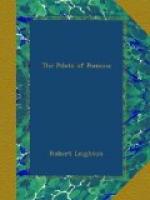The wind had fallen almost to a dead calm very soon after I had come alongside the Pilgrim, and I had thus been able to keep the two vessels together without any difficulty. But that afternoon as I sat before my fire reading a book on navigation—that part of it relating to the art of taking an observation on the sun, moon, and stars—the schooner listed over to larboard, as though the wind had caught her sails. I rushed up on deck and found that a strong breeze was blowing from the northwest, and was filling the sails of both vessels. The Pilgrim, indeed, was sailing with considerable speed, dragging the schooner along with her.
I ran forward and cast off the rope that held us together. Not too soon, for the barque was leaning over on her port side and visibly settling down.
As speedily as I could I trimmed the schooner’s sails and got her free. She took the wind bravely, and I left the Pilgrim to leeward. I watched her struggling on the gradually rising waves as she tossed about aimlessly for the space of about half an hour. Then I saw her bows dip deep into the water and her stern rise high, while, with a heavy plunge and a surging sound that came to me like a melancholy groan, she disappeared, carrying her lifeless crew with her to that tomb for which they had waited so long.
Chapter XXXIII. The Light In The Gaulton Cave.
The favourable breeze from the northwest continued with little variation for several days after the foundering of the Pilgrim, and I kept the schooner on the one tack, sailing before the wind, with the tiller often tied up for many hours together without my needing to touch it. I contrived, after many failures, to take an observation on the second day, for the sky was then clear, and I had all the necessary appliances excepting only the skill to use the quadrant with a seaman’s confidence. I made out that I was to the northwest of the Faroe Islands, and I made no doubt that I should sight one of that group in the course of that same day or the day after.
But such was not to be my good luck. For eight full days and nights I kept on the same course, with a dull, leaden sky above and a mist creeping over the sea, and never a bit of land could I discover, nor any light, whether of beacon or of ship.
On the twelfth day after the sinking of the Pilgrim, however, I saw, to my great joy, a strip of land on the southeastern horizon. I had not the slightest notion whether it belonged to the Faroe or to the Shetland islands, but I fancied it might be the latter. It was a small island with a high rocky coast, and a vast number of sea fowl flying about and above it.
I was some six miles from the island when I noticed a brown-sailed fishing smack bearing out towards me. As the boat came near enough I hailed it. Two men were aboard, and they answered me in good Orkney dialect. They dropped alongside of the Falcon, and I threw them a rope’s end.




